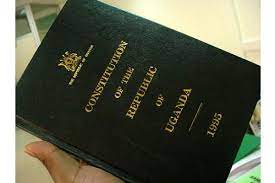Prime
Ignore 7-year term extension talk for political office, says law reform commission

The Uganda Law Reform Commission, has asked the public to ignore an amended version of the constitution, indicating that the parliamentary and local government council term of office is now seven years from the previous five.
What you need to know:
The commission clarifies that in the Supreme Court appeal judgment of Lawyer Hassan Male Mabirizi Vs Attorney General popularly known as the age limit petition, declared sections 2, 6, 8, 9 and 10 of the constitution, extending the term of office of parliament and local government to seven years as unconstitutional.
The Uganda Law Reform Commission, has asked the public to ignore an amended version of the constitution, indicating that the parliamentary and local government council term of office is now seven years from the previous five.
Lately, social media platforms have been awash with an amended version of the 2020 constitution, stating that the tenure of political office is now seven and not five years.
“The commission has learnt there is a version of the constitution in circulation that has caused concern with regard to the tenure of the parliament and local government councils from five years to seven years as enacted in the constitution (Amendment) Act, 2018, Act 1 of 2018 extending the tenure of Parliament and local government councils from five years to seven unconstitutional,” reads in part the statement by the Law Reform Commission.
“The public is urged to ignore the version of the constitution circulating on social media as prepared by the Printing and Publishing Corporation that purports to imply that the tenure of parliament and the local government council was extended from five to seven years.”
The commission further in its statement, went on to explain that whenever the constitution is amended, part of its mandate is to update it.
It adds that it’s upon this background that it updated the constitution when the tenure of the political term of offices, was changed from five to seven years.
However, the commission clarifies that in the Supreme Court appeal judgment of Lawyer Hassan Male Mabirizi Vs Attorney General popularly known as the age limit petition, declared sections 2, 6, 8, 9 and 10 of the constitution, extending the term of office of parliament and local government to seven years as unconstitutional.
“The commission in its reproduction of the constitution as at 30th September, 2020 reflected the above decision of the Supreme Court by way of footnotes to provide an explanation.” the statement read in part.
Adding: “Whereas the above provisions were declared unconstitutional, Parliament is the only body mandated to amend the constitution as provided in Article 259. Therefore, the provisions of Act 1 of 2018 that were declared unconstitutional, remain in the constitution until removed by parliament through an Act of Parliament in order to expunge from the constitution.”
While amending the constitution in December 2017, Parliament voted to extend its term of office from five to seven years but it was rejected by the Constitutional Court in the petition by Male Mabirizi and others Vs Attorney General.
The Justices of the Constitutional Court led by then Deputy Chief Justice Alfonse Owiny-Dollo ruled that it would be a breach of contract entered with the electorate at the start of their term in May 2016 since they had given then a social contract of five years and not seven.
Likewise, about two years ago, the Supreme Court upheld the Constitutional Court decision that rejected the extension of the just concluded term of Parliament and local government councils to seven years from five, stating that the same was unconstitutional.




